Europa Universalis 5 is so complex its developers will let you automate half the game
But should you?

I am rewriting the history of Korea, and there are blotty ink stains everywhere. Europa Universalis 5 was announced yesterday, the official unveiling of a grand strategy game that has been an open secret since April last year, thanks to a long-running dev diary. As reveals go, it was less a cloak and dagger ambush and more an elephant charge that everyone in Europe could see coming from fifteen countries away. Still, elephants are always nice. I got some hands-on time with an early build of the map-happy historical simulation, and I'm delighted to report that the kingdom of Korea is struggling. After instituting many new laws, the leader of the nation has passed away. He was steely, noble, robust, and will be remembered as much for his kindness as his strength. He died of the common cold.
It's okay, the computer will clean all this up.
But wait, before I get into how much power the game's AI has, let's cover the basics. If you have no clue about Europa Universalis, just know that they're big, complicated historical sims about building huge empires and engaging in questionable geopolitics. You play as the crown of an entire country, and you steer that impossibly large tanker through hundreds of years of human history. Europa Universalis 5 starts in the year 1337 and it stops in... well, we're not yet sure (Paradox isn't telling). But it'll be enough time that trade will flourish, new wonders will be invented, and nations will rise and fall through revolution and reform. A lot of people will die of plague.
Or smallpox, in the case of Korea in the 1300s. My capital, Kaesong, is stricken by the disease early in the game, and I get a notification that the "pop" numbers there are dwindling rapidly. These "pops" are new to EU5, but not new to Paradox strategy games. If you've played Victoria 3 or Stellaris, you'll understand a little the nature of these digitised peoples. A pop is basically a unit of humanity, and you need to keep them satisfied and healthy if your country is to benefit. Their needs often flash up as a bulletin: saffron, wheat, beer, cloth. Smallpox, as far as I can tell, is not a need.
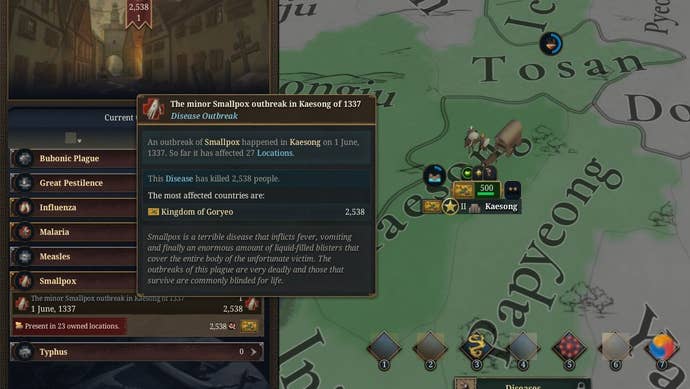
But I can do little about it, only watch as my people dwindle, knowing that each diminished pop means fewer workers in factories, and fewer folk to recruit in armies (a fact that has big implications for warmongering players). For now, I will do what I can. I reform the harbours, making all our ports more efficient. I build a bunch of cloth guilds and fiber crop farms in the south of the country. I send diplomats to China, Japan, and Vietnam to improve relations. And I build a wharf in poxy Kaesong to attract more sailors (we'll need 'em once the pest clears). Finally, I appoint two clever cabinet ministers to develop the south of our country, and to go on a charm offensive to neighbouring nations. These characters won't be as fleshed-out as, say, the councillors of Crusader Kings 3. But Paradox do plan for the named people in EUV to have a little more colour to them than in the previous game.
So far, it feels very Europa, very Universalis. I do much of my national tweaking before I even press the "unpause" button at the start of the game. This is how you'll often play a Paradox grand strategy game. You blast the game's speed up (a little timer in the corner) until a bunch of important events happen, then freeze it for an extended round of reform and rejigging. History runs fast and slow, depending on how chaotic things have gotten. Wartime, in particular, involves a lot of pause-spamming, as you manoeuvre troops this way and that.
But not for me. This time I've handed military matters over to the game's newly minted automation. This big new feature manifests as little cogwheels you click above specific menus, to flag you'd rather the game itself do the hard sums. I go through the nature of automation more in a separate massive Europa Universalis explainer post but basically you can now hand off a surprising number of the game's nitty-gritty systems to the AI. Don't care about setting taxes? Click the auto-cog. Can't stand the thought of choosing what building is good for the economy? Smash that cog button. Hate the army and everything they stand for? Cog time.
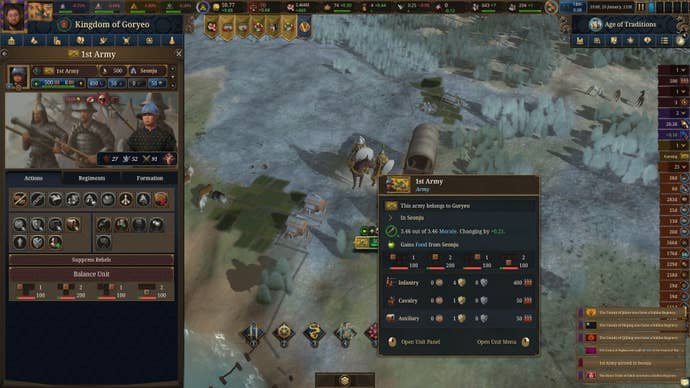
So instead of a militaristic nation of Korean conquerors, I spend the next few years dipping around the map, in and out of production and trade menus, requesting a tar pit here, a gold mine there. It is the equivalent of the king showing up at every backwater village in the country on a grand tour, scratching his chin for 30 seconds and saying: "Fish. You make fish now." Then leaving the local peasants in a scramble to retrain.
My "gardening" approach to the country's development results in serious population and employment fluctuations, as labourers automatically migrate between provinces to work in the new pepper farms and cloth mills that I build in areas far from their homes. I'm sure none of this will cause any disruption to society. Besides, it is good for a people to see their king. I am a man of the commons! A friend to peasant and farmer alike!
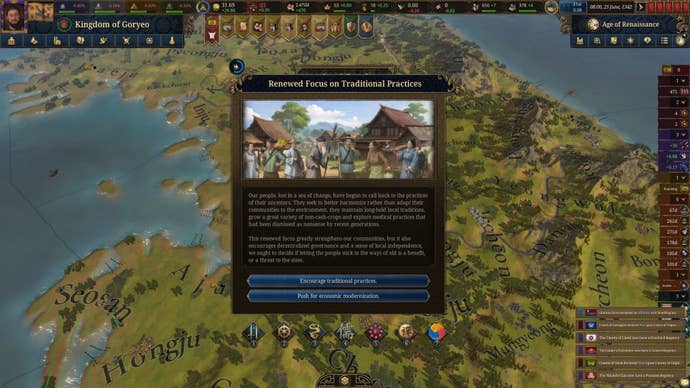
Perhaps too much so. The urban classes are getting annoyed. And the elite aristocracy are giving me serious side-eye. This is another new feature to EU5 - there are four big groups you'll need to keep broadly satisfied if you don't want to get into trouble. These four "estates" include the clergy, the commonfolk, the nobility, and the city-dwelling merchant classes (the burghers). I keep comparing this to the (much simpler) lobby group juggling of Reigns, the swipey king sim in which you need to balance church, army, public, and treasury, or face a nasty beheading.
In EU5, however, there isn't a hard "game over" from neglecting or irritating a single group. But trouble will arise. For example, in Korea the nobility held over 50% of the voting power in our parliament. Which meant any time a parliamentary debate occurred (one way of instituting helpful new laws) I had to sleazily sidle up to the aristocracy like a greasy fanboy. The laws that would benefit the nobles always had the most chance of passing, and if I wanted anything else done, they held most sway.
Careful manipulation of the estates over the course of a game can decrease the power of some and put others on a more even footing, but also light the long fuse for all the decade-by-decade disruption that comes with such a change. Like anything in these games, a shift in power takes a long time. In the shorter term, you'll be keeping the commoners or burghers happy by granting them privileges - basically little stickers that go in a column next to their name in one menu, which offer various benefits to that group.
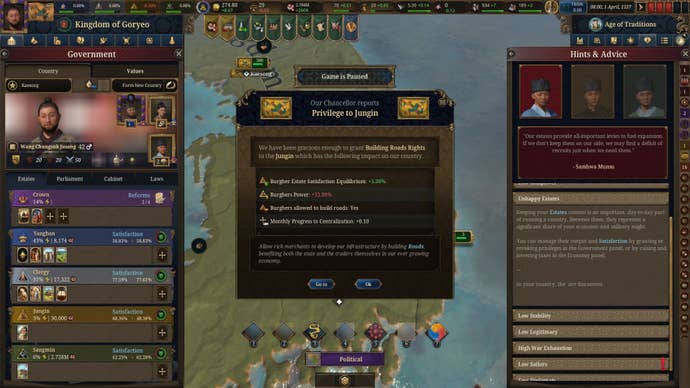
In Korea I let the urban class build their own roads, for example, normally the reserve of the upper class. For the commoners I gave my blessing for free movement between provinces, undoubtedly annoying any noblefolk who wanted an immovable serfdom. But how else am I supposed to spread smallpox to all those in need? Also, all those new factories I built down south were sitting empty. The business district requires blood.
Meanwhile, the generals, who I have largely left to their own devices using those robust automation gizmos, have declared that the nation of Ssangseong (a northern chunk of the peninsula not officially part of Korea yet) is ripe for the picking. We have full right to march in and take it, I am told. I find this disagreeable to Buddhist principles - a religion I adhere to strictly. So strictly that I recently made it law that all future heirs must be the same religion.
No. We will not do a war today. It's not on my to-do list. But the game helpfully informs me that it is a historical event. If I hover over the option to press my claim, I'm told: "This event option... will make you take the same decision as the country did in history." A handy little note. But I refuse to indulge the army's bloodlust just because it is the "canon" lore of Korea. No, I want to see what all the other complicated bits and bobs do before I go stomping into the battlefields. What's more, I need all those peasants in my pepper fields, silver mines, and cloth mills. Because money appears to be running low.
At this point, I decide to experiment. I hand over the markets and trade to the game's automation too, wondering if it will do a better job.
It instantly doubles my monthly income.
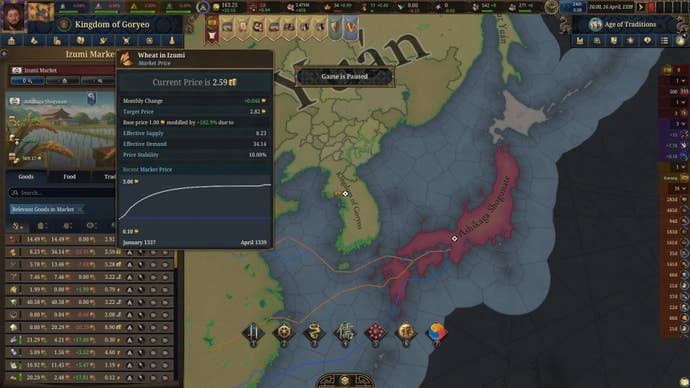
And here's the rub with EU5, as it exists so far. The automation is billed as a helpful feature for newbies. But when used, it can actually obscure the machinery of the game further. Give the computer control of your building queue and vast chunks of change will vanish from your treasury without you knowing where it went. Hand over army manoeuvres and patrols to the AI, and you may suddenly see an enemy army slipping through the lines, because something else was more important to the black box. I have no idea what trades and deals the game was doing to get that cashflow. Not only that, but my enjoyment of these parts of the game quickly seeped away once the machine was playing itself. If I wanted my time with Korea to be fun, I had to accept that I would earn less money.
For seasoned players, automation may prove a useful tool for offloading certain economic decisions in difficult eras when they need to focus like a laser beam on military tactics. But for a new player, I worry it'll actually cause extra confusion. It's hard to know what's happening under the hood of this clockwork contraption when you're supposedly in control, never mind when you hand some of that control to a helpful gremlin. Of course, the game isn't done yet, and none of it is yet tutorialised. Everything may be more clearly presented on release day.
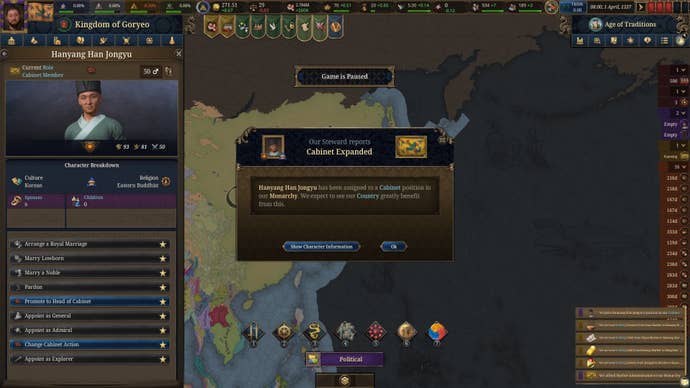
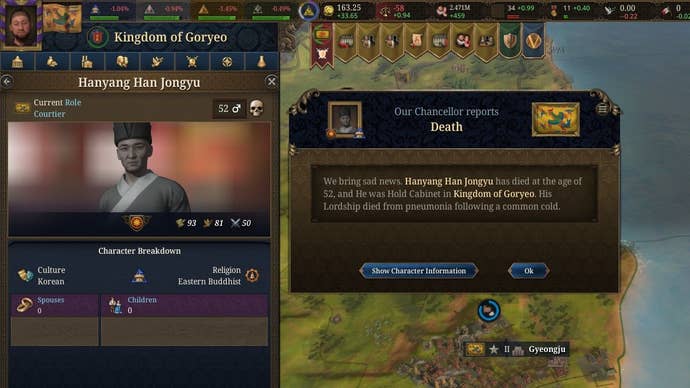
With the trade doing its own thing, and a lovely network of dirt roads developing throughout the south, I forgo my chance to see how Korea evolves in its quest to become a capitalistic hellstate and throw off Mongol oversight. Instead, for a final glory lap before my time with the preview build runs out, I start a new game in good old Ireland, where all despots' dreams go to die.
To be more accurate, I rule a single county in Ireland. My struggle as the petty king of Donegal conforms to the general experience of playing as a chieftain in Ireland in other Paradox games. In that you are poor, useless, and your army consists of about 50 cattle-raiding lunatics at any one time. As an Irishman, it is exceedingly difficult to get anything done. Playing as small territories like this is playing Europa Universalis in hard mode, and confirms that the series remains, at its most overwhelming, a sequence of interesting buttons that are greyed out or otherwise unclickable.
You can sometimes easily discover why you're unable to do something by reading the flavour text or following tooltips. But often you're none the wiser. Why can't we get rid of this nationwide rule that deeply drains our diplomatic clout? No clue. Why can't my cattle raiders besiege this one city? Dunno. How come no marriageable partners show up when I scour Europe for them? Hm. Might just be my profile pic.
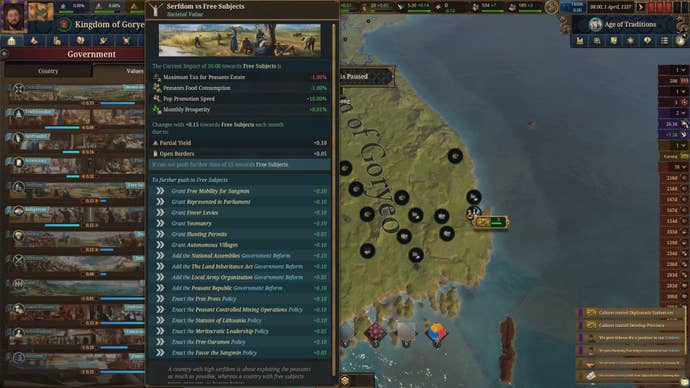
There are answers to all the puzzlements that arise as you click around, but they are often tucked away. So yes, all the open-ended complex wizardry of Europa Universalis seems to be here for the sequel, but so is all the nitpicky "you can't do that" non-buttonry which can be a turn off to some. Especially to beginners who often walk away nonplussed and baffled as to what they're supposed to even do. Shouldn't a king be powerful? Well yes, but not if you have -100 opinion and poor "tribal cohesion", whatever that means. In this respect, the pain threshold for Paradox grand strategy doesn't appear to have been abolished. Is giving players an automation button the fix for such confusion? I'm doubtful, but again, we've yet to see the final implementation.
But crucially for Paradox, the complexity won't matter a jot to anyone with hundreds of hours of the previous game under their medieval chastity belt. Judging from my Korean country-mongering, the slavering sicko who is normally attracted to these games will be furiously pushing the plus key in their brain to speed up time until release day. I'm disgusted to report that I am one of them.

